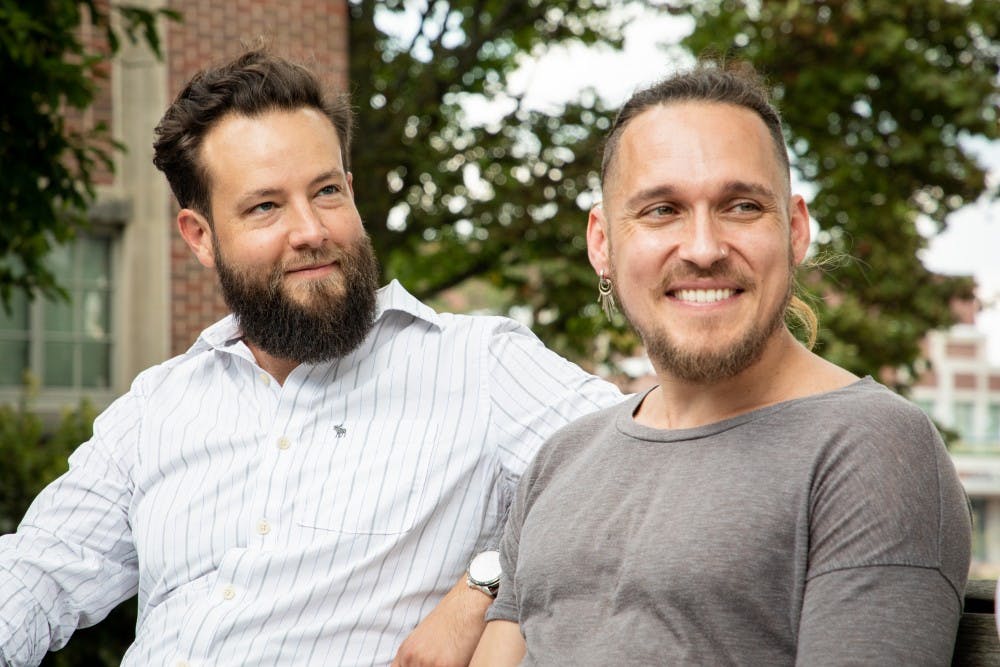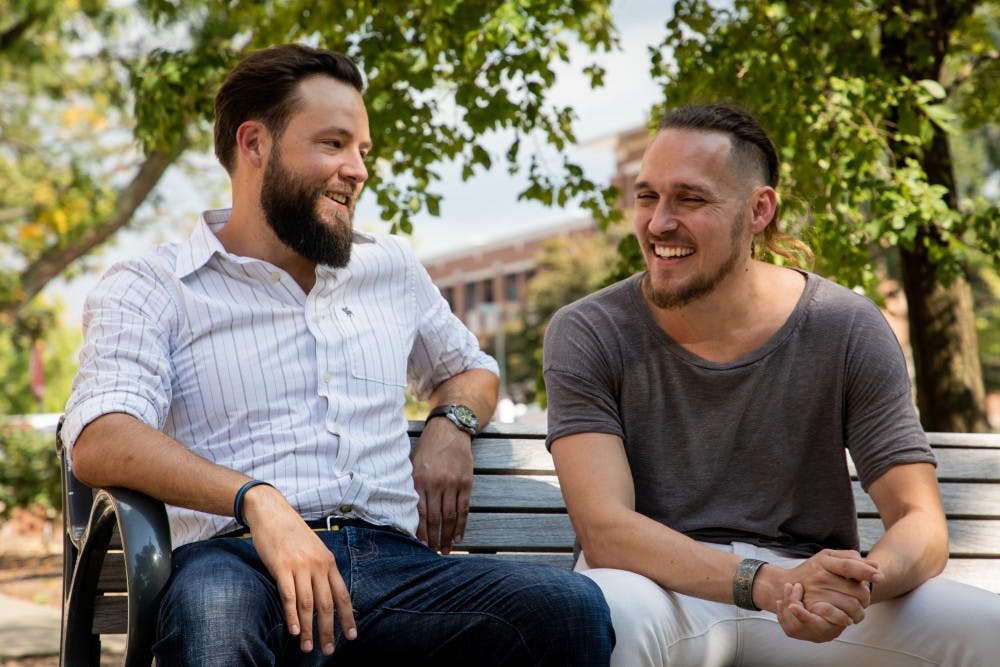On a given day, Henry Velandia could be more than 600 miles from his husband.
Velandia’s home with Josh Vandiver, Ball State assistant professor of political science, is in Muncie, but his job as a dance instructor often requires him to travel.
While distance is a common source of strain on relationships, the couple said they have a bond that has already been tested and thus strengthened by many obstacles.
Velandia and his family came to the United States from Venezuela in 2002. While in the U.S., Velandia said he began pursuing his passion for dance.
Then, in 2006, Velandia and Vandiver met in New Jersey.
Vandiver chalks it up to fate — he was a graduate student at Princeton University, Velandia knew other graduate students there and things “just worked out.”
“[We] immediately hit it off and were almost inseparable from that point on,” Vandiver said.
He said the best way to describe Velandia is as “phenomenal.”
“It’s the first word that comes to mind. He has these visions, this indomitable capacity to keep going and overcome hardships — he really is a phenomenon,” Vandiver said. “He’s got his own vision, he pulls communities together, he’s unstoppable. I have to keep up on my game so that I can be a fraction as phenomenal as he is, and I so admire that about him — it’s part of why I love him.”
From the beginning of their relationship, Velandia said they were able to connect on a level that allowed them to “grow up together.” Vandiver had come out to his immediate family members, but Velandia felt he was not able to recognize his sexuality until he came to the U.S.
“[Venezuela is] a latin country, so it’s a little tougher to come out just [because of] the culture [and] the religious beliefs,” Velandia said. “A lot of things prevent you from being open and talking about, ‘Oh, you’re exploring.’ It’s not really allowed, but in America, you find that opportunity. So, to me, America was like the American dream for many reasons — and I found my American boy, too.”
Velandia and Vandiver decided to take the next step in their relationship in 2007 by taking advantage of Princeton University’s domestic partnership program, which recognized same-sex couples as partners and allowed spouses access to benefits including housing and health insurance even though the federal government had yet to recognize same-sex marriages.
During this time, the Defense of Marriage Act (DOMA) was still in effect.
Signed in 1996 by then-president Bill Clinton, the act specifically denied same-sex couples’ federal benefits including “legal recognition of relationships, access to a partner’s employment benefits, rights of inheritance, joint tax returns and tax exemptions, immigration or residency for noncitizen partners, next-of-kin status, protection from domestic violence, and the right to live together in miliatry or college housing,” according to the Encyclopedia Britannica.
The DOMA also “mandated that states banning same-sex marriage were not required to recognize same-sex marriages performed in other states and … for the purposes of federal law, marriage could occur only between a man and a woman.”
Vandiver and Velandia further saw the limitations the DOMA placed on their relationship when Velandia ran into trouble obtaining an employment visa.
“We had an attorney trying to help [Velandia] with his employment visa, [and this was] not a good attorney, it turns out,” Vandiver said. “[Velandia] ended up being in deportation proceedings in 2009.”
The couple felt they had two options: flea the country and go into exile to be together, or fight for Velandia’s right to stay in the United States.
They decided to become activists.
“We wanted to proceed with our life as if we expected the kind of rights that any American citizen who was part of an opposite-sex couple would have,” Vandiver said. “If I had married a woman, she would have gotten immigration benefits through a process that everyone goes through when applying for a green card based on marriage, but even though we were married [in 2010], we couldn’t take that route.
“We couldn’t achieve any kind of permanent status formula because of the [DOMA].”

Josh Vandiver and Henry Velandia smile in the Quad during an interview with The Daily News Sept. 13, 2019. At the time of their marriage, Velandia faced deportation laws that differed for same sex couples than for opposite sex couples. Eric Pritchett, DN
As Velandia and Vandiver began speaking out about their situation, Vandiver said, they met other couples in similar situations and began learning how to be activists.
One of the most important parts of activism, the pair found, was knowing how to explain what was going on in concrete legal and political terms while simultaneously conveying that they were afraid of the possibility that they would be separated.
“There were many times that … it’s like you couldn’t breathe because at any moment, something could happen … but we stuck to it,” Velandia said. “We just put our best positive energy and our work to it.”
Eventually, the couple found themselves representing others in their situation through interviews with The New York Times, CNN and MSNBC.
Vandiver said his background in political science was helpful when he was trying to convey his message. While balancing the emotional toll of their situation and properly conveying a message was difficult at times, he said he felt privileged to be in a position that they were able to get media attention.
In 2011, Vandiver said they reached a turning point in the fight against Velandia’s deportation.
“The Obama administration and its justice department started making some decisions that, while they couldn’t grant someone … married to someone of the same sex permanent residency, [the government] could decline to pursue the deportation process,” Vandiver said. “Because resources are limited, they had to prioritize who’s going to get the court resources, the legal resources from the government to put on their case to effect a deportation.
“They started saying, ‘Well, these are our lowest priority cases … so we are going to close somebody like Henry’s case.”
Vandiver said Velandia’s deportation was the first of its kind to be “administratively closed,” and while it did not mean Velandia was safe from deportation, it gave the couple some breathing room.
It wasn’t until two years later that the Supreme court ruled the DOMA was unconstitutional after hearing the case of The United States v. Windsor.
When Edith Windsor’s wife, Thea Spyer, died, she inherited Spyer’s estate. Because the couple’s marriage was not federally recognized under the DOMA, however, Windsor was faced with $363,000 of taxes and was not eligible for a marital exemption to the tax that would have been allowed had her spouse been a man.
The 5-4 Supreme Court ruling applied to each aspect of the DOMA, which meant Velandia’s case could officially be terminated.
December 7, 2018, is Velandia’s “American birthday,” the day he officially became a U.S. citizen.
Today, the couple said they are able to focus on the future of their careers as well as their relationship.
Vandiver received a tenure-track position at Ball State three years ago. Velandia has continued to explore his passion for dance and often travels to New York to teach and perform.
They both said they have noticed their experience with deportation and consequential activism influenced their professional lives — Vandiver teaches a minority group politics class at Ball State, for example.
“[Vandiver] inspires many people while he’s teaching,” Velandia said. “It’s his way of helping people think outside the box and just be open to learning.”
Vandiver added that the experience taught him each person has to be their own activist. While the couple hopes to remain a supportive resource for future activists, they want to step back so “other faces can come forward, new communities can be engaged and new experiences and expertise ... could be developed in those who chose to be activists.”
“I don’t want to be prescriptive,” Vandiver said. “It’s up to everyone to make their voice heard in the way they want it to be heard and express the change they would like to see.”
With a smile and a shrug of his shoulders, Velandia said that brush deportation, the reason why he and Vandiver had to become activists, was frustrating. In retrospect, it was a “bittersweet symphony.”
“When we were in the process of fighting for our marriage, that was a really intense time for us, but it brought us together,” Velandia said. “We sometimes think about it, reminisce about that moment, and we are really thankful for what happened.”
Contact Brooke Kemp with comments at bmkemp@bsu.edu or on Twitter @brookemkemp.





